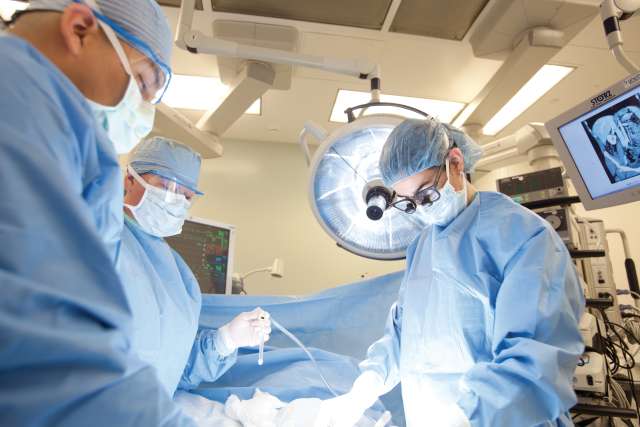Summer visits to her grandparents' farm in rural Mexico planted the seed for Melissa Rios' childhood dream of becoming a doctor.
Her grandmother told her stories about Rios' mother temporarily losing the ability to walk at age 12, when a throat infection led to rheumatic fever and severe joint pain. Rios' grandfather was forced to sell a parcel of farmland to pay for the family's three-hour bus ride to the hospital and his daughter's medical care.
"In Mexico, I learned how education, poverty and health are inextricably linked," said Rios, now 28. "I witnessed children my age missing school and working in the fields to feed their families."
Having grown up in the United States, she vowed to take advantage of her American education to make a difference.
On May 29, that pledge came true. Rios graduated with a dual degree from the and the . Her goal is to become a pediatrician and help all children receive the medical care they deserve, regardless of finances.
Dressed in her cap and gown, a beaming Rios kept her eyes glued to the TV screen at the Sylmar home of her parents, Rutilio and Enedelia Rios. To prevent the spread of COVID-19, UCLA had converted the Hippocratic Oath ceremony to a event.
When Rios' name was announced and her smiling photo flashed onscreen, she tightly embraced her parents and fiancé, Matthew Rieck, a nurse at UCLA Health - Santa Monica Medical Center. Her brother Oscar, a professor of mechanical engineering, cheered from Florida via FaceTime.
Completing the circle, her grandparents, aunt, uncle and cousins applauded from her aunt's home in Zacatecas, her 6-year-old cousin screaming with excitement.
"It felt absolutely incredible to hear my name introduced as "Dr.,'" said Rios, her voice shaking with emotion.
Reaching this milestone took years of sacrifice and hard work.
Rios' parents came to the U.S. in 1999 in their early 20s with little money, no English and sixth-grade educations. Both knew that higher education would lead to better futures for their children. Every weekday, her mother drove Rios and her brother 45 minutes each way from Sylmar to El Camino Real High in Woodland Hills, which offered a strong college-prep curriculum.
One of a handful of Hispanic students in her six Advanced Placement classes, Rios found it difficult to relate to her classmates.
"I had very few friends, and perhaps it was an advantage," she told the . Picked on for her petite frame and younger appearance, she avoided bullies by spending her lunch breaks in the classroom, using the time to complete her homework and receive support from her teachers.
Life brightened during her senior year, when Rios met Rieck in French class. The two bonded over study dates at coffeehouses, sharing their dreams of college and careers.
She also welcomed visits from her grandfather, who repeatedly traveled from Mexico to the U.S. to seek medical care for his diabetes. But the language barrier prevented her mother and him from understanding the severity of his condition — or his doctors' instructions for managing his blood sugar at home. Her mother often left appointments in tears, frustrated at her inability to communicate with her father's doctors. She watched helplessly as he lost his vision and suffered a finger amputation before succumbing to the disease.
That's when Rios' dream of becoming a doctor crystalized. "I felt that if I spoke Spanish with my patients, life would be easier for them," she told .
Armed with a $5,000 scholarship and financial aid, Rios enrolled as a biological sciences major at UC Irvine, working part time in a research lab.
A summer pipeline program at the David Geffen School of Medicine for minority students interested in health care proved a pivotal influence. The six-week profoundly shaped her future.
"It was the first time I'd ever met a Latino medical student," Rios recalled. "The experience boosted my confidence to apply to medical school."
After college, Rios worked with the in Orange County to educate the Latino community about diabetes management — an interest driven by her grandfather's long struggle with the disease. The two-year experience fueled her passion for public health outreach.
"I saw the power of medicine coming together with public health and health education to change patients' lives," she said.
In 2015, UCLA notified Rios that she'd been selected for a coveted covering all expenses related to her medical education.
She enrolled in UCLA's five-year program, which offers a concurrent master's degree in public health, business or public affairs to mold physician-leaders interested in working with medically underserved populations. Immediately she felt at home.
"My PRIME classmates and I shared similar backgrounds and a common passion for increasing ethnic diversity in the medical field," she said. "Plus, I really wanted a dual degree. I knew that an MD alone wouldn't allow me to empower my patients and improve community health the way I wanted."
Rios is a superb example of how PRIME trains young doctors to tackle health care disparities, according to Dr. Gerardo Moreno, executive director of the program.
"We need more Spanish-speaking physicians like Dr. Rios to meet the health care needs of the Latino community," said Moreno. "She has a passion for helping Hispanic youth and has served as a mentor to many of them."
Soon Rios will launch her pediatrics residency at Children's Hospital Los Angeles, where she plans to continue making mentorship a priority.
"I didn't achieve these goals on my own," she said. "UCLA provided me with great mentors who guided me through medical school. I hope I can serve as a role model and help other low-income and minority students achieve their dreams."



